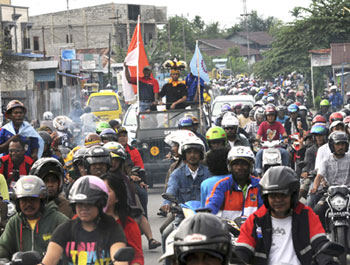

Vol. 76/No. 2 January 16, 2012

|
| AP photo |
| Miners celebrate in Papua, Indonesia, after winning strike against Freeport-McMoRan. |
“This is not the end, only the beginning” of our struggle, said union spokesperson Juli Parorrongan in a Dec. 14 press statement. “The energy and unity of our struggle now enters the workplace.” Miners returned to work Dec. 17.
The heart of the strike, the union statement says, was a “fierce blockade” at Mile 28 on the only road between the port of Timika and the company’s open-cut and underground mining complex in the central highlands of Papua. As well as blocking supplies from getting to the mines the union action prevented the company from repairing the 70-mile slurry line that carries ore concentrate to the port.
Production, worth $5 billion to Freeport in 2010, was slashed to 5 percent during the strike, and the company was forced to suspend its contracts.
As part of the settlement Freeport agreed to pay three months back pay as a “signing bonus” and allowances for health care, housing, education, shift premiums and other bonuses that will be calculated by a method proposed by the union.
Almost all of the 9,000 field operators employed by Freeport at the mine took part in the strike. There are also 3,000 salaried staff and another 10,000 contract workers there.
During the strike two miners were shot dead by the police in Timika at a protest against busing in of scabs. Twelve strike leaders were later charged with “disturbing the public order.”
Over the years Freeport has paid tens of millions of dollars to the Indonesian troops and police deployed to protect the mine bosses’ interests.
There is a long history of struggle for self-determination in the province and of protests against the mine itself. In mid-December the Indonesian army launched an offensive against pro-independence fighters in the Lake Paniai region, some 80 miles northwest of Timika. There are reports that 20 people have been killed and 26 villages razed with 10,000 people fleeing the area.
In October, Indonesian cops broke up the Papuan People’s Congress being held in the provincial capital Jayapura. The trials of five Papuan leaders held in prison on treason charges since then are expected to start in January.
The miners’ struggle is having an impact across Indonesia as workers fight for higher wages in the context of an economic expansion over the last couple of years.
In Jakarta the minimum wage was raised by 20 percent Nov. 20 in face of a strike threatened by one of the main union federations. Four days later, some 10,000 workers marched in the Indonesian island of Batam, near Singapore, clashing with the cops over two days. The governor there increased the minimum wage by 25 percent Dec. 13.
Related articles:
Wash. port workers win initial frame-up battles
ILWU calls mobilization to meet scab ship
On the Picket Line
Help build ILWU action in Wash.
China: fights by toilers heat up, economy cools
Front page (for this issue) |
Home |
Text-version home